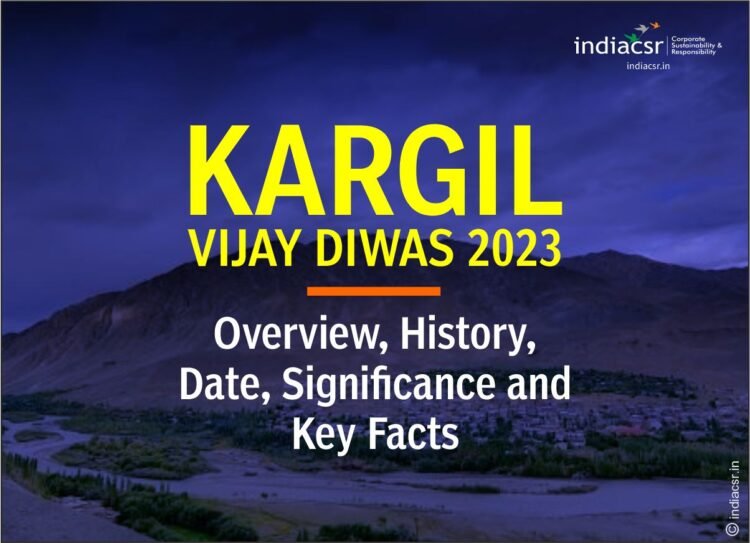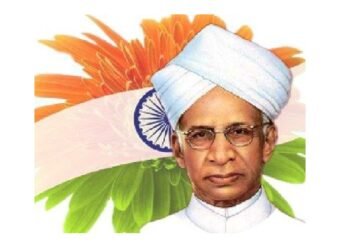Introduction
Kargil Vijay Diwas is a national holiday in India that is celebrated on July 26 every year. The day commemorates the victory of the Indian Armed Forces over Pakistan in the Kargil War of 1999.
The Kargil War was a conflict between India and Pakistan that took place in the Kargil district of Kashmir. The war began on May 3, 1999, when Pakistani troops and Kashmiri militants infiltrated into Indian-administered territory along the Line of Control (LoC). The Indian Army launched Operation Vijay to evict the infiltrators. The war ended on July 26, 1999, with the Indian Army regaining control of all the disputed territories.
The Kargil War was a major victory for India and showed the world that the country is capable of defending its borders. The war also highlighted the importance of the Indian Armed Forces.
History of the Kargil War
The Kargil War was a conflict between India and Pakistan that took place in the Kargil district of Kashmir and elsewhere along the Line of Control (LoC) from May to July 1999. The war was triggered by the infiltration of Pakistani troops and Kashmiri militants into Indian-administered territory along the LoC.
The Indian Army launched Operation Vijay to evict the infiltrators. The war was fought in extremely difficult conditions, with the soldiers operating at altitudes of up to 20,000 feet.

The war ended on July 26, 1999, with the Indian Army regaining control of all the disputed territories. Over 527 Indian soldiers were killed in the war, and over 1,300 were wounded.
The Kargil War was a major victory for India and showed the world that the country is capable of defending its borders. The war also highlighted the importance of the Indian Armed Forces.
Kargil War – Date
The Kargil War began on May 3, 1999, when Pakistani soldiers disguised as Kashmiri militants infiltrated Indian-held territory in the Kargil district of Kashmir. The Indian government responded by launching Operation Vijay, a military operation to evict the Pakistani forces from Indian territory.
Kargil Vijay Diwas Significance
The Kargil War was a significant event in the history of India and Pakistan. It was the first time that the two countries had fought a major war since the 1971 war. The war also had a significant impact on India-Pakistan relations, which have remained tense ever since.
Operation Vijay
Operation Vijay was the code name for the Indian military operation that was launched in May 1999 to evict Pakistani troops and Kashmiri militants who had infiltrated into Indian-administered territory along the Line of Control (LoC) in Kargil. The war lasted for 60 days, from May 3 to July 26, 1999.

The Indian Army launched Operation Vijay in response to the infiltration of Pakistani troops and Kashmiri militants into Indian-administered territory. The infiltrators had taken up positions on high-altitude peaks in the Kargil sector, which gave them a strategic advantage. The Indian Army launched a series of operations to evict the infiltrators, and they were eventually successful in regaining control of all the disputed territories.
Operation Vijay was a major victory for India. The Indian Army was able to evict the infiltrators and regain control of all the disputed territories. The war also led to a renewed focus on peace and stability in the region.
The Bravehearts of Kargil
The Kargil War was a very difficult war, and the Indian soldiers who fought in it showed great bravery and courage. Many Indian soldiers were killed or wounded in the war, and their sacrifices will never be forgotten.
The Sacrifices of the Indian Soldiers
The Indian soldiers who fought in the Kargil War made great sacrifices. They fought in difficult conditions, and many of them were killed or wounded. Their sacrifices helped to ensure India’s victory in the war, and they will never be forgotten.
The Impact of the Kargil War on India-Pakistan Relations
The Kargil War had a significant impact on India-Pakistan relations. The war led to a deterioration in relations between the two countries, and it has been difficult to improve relations since then.
The Kargil War and the Indian Democracy
The Kargil War also had an impact on the Indian democracy. The war showed the resilience of the Indian democracy, and it helped to unite the Indian people.
The Kargil War and the Quest for Peace in the Region
The Kargil War was a reminder of the need for peace in the region. The war showed that the two countries are still capable of fighting a major war, and it is important to find a way to resolve their differences peacefully.
Timeline of the Kargil War
| Date (1999) | Event |
|---|---|
| 3 May | Pakistani intrusion reported in Kargil district by local shepherds. |
| 5 May | Indian Army patrols sent out; 5 soldiers captured and killed. |
| 9 May | Heavy shelling damages Indian ammunition dumps in Kargil. |
| 10 May | Multiple infiltrations confirmed across LoC in Dras, Kaksar, and Mushkoh sectors. |
| Mid-May | India deploys more soldiers from Kashmir Valley to Kargil district. |
| 26 May | Indian Air Force (IAF) begins airstrikes against suspected infiltrator positions. |
| 27 May | IAF MiG-21 and MiG-27 shot down by Pakistani surface-to-air missiles; MiG-27 pilot captured as POW. |
| 28 May | IAF Mi-17 shot down by Pakistani forces; four crew members killed. |
| 1 June | Pakistan Army shells India’s National Highway 1 in Kashmir and Ladakh. |
| 5 June | India releases documents proving Pakistan’s involvement in the conflict. |
| 6 June | Indian Army launches major offensive in Kargil. |
| 9 June | Indian troops recapture two key positions in the Batalik sector. |
| 11 June | India releases intercepts of conversations between Pakistani COAS Gen. Pervez Musharraf and CGS Lt. Gen. Aziz Khan as proof of involvement. |
| 13 June | Indian forces secure Tololing in Dras after fierce battle with militias backed by Pakistan. |
| 15 June | US President Bill Clinton forces PM Nawaz Sharif to withdraw Pakistani troops and irregulars from Kargil. |
| 29 June | Pakistani forces begin retreat from Indian-administered Kashmir; Indian Army advances towards Tiger Hill. |
| 4 July | Three Indian regiments engage Pakistani Northern Light Infantry in Battle of Tiger Hill; region recaptured after 12+ hours of fighting. |
| 5 July | PM Nawaz Sharif officially announces Pakistan Army’s withdrawal from Kargil; Indian forces take control of Dras. |
| 7 July | Indian troops recapture Jubar Heights in Batalik. |
| 11 July | Pakistani forces disengage; India retakes key peak points in Batalik. |
| 14 July | PM Atal Bihari Vajpayee declares Operation Vijay a success; India sets conditions for talks with Pakistan. |
| 26 July | Kargil War officially comes to an end; Indian Army announces complete withdrawal of Pakistani forces. |
How to Celebrate Kargil Vijay Diwas
Kargil Vijay Diwas is celebrated on July 26 every year to commemorate the Indian victory in the Kargil War. There are many ways to celebrate Kargil War Anniversary, such as:
- Attending a flag-raising ceremony
- Visiting a war memorial
- Reading about the Kargil War
- Making a donation to a military charity
The Legacy of Kargil Vijay Diwas
Kargil Vijay Diwas is a day to remember the sacrifices of the Indian soldiers who fought in the Kargil War. It is also a day to reaffirm India’s commitment to peace in the region.
The Future of India’s Security
The Kargil War was a wake-up call for India. It showed that India needs to be prepared for future challenges to its security. The Indian government has taken steps to improve India’s security, but there is still more work to be done.
Important Facts About Kargil Vijay Diwas
- Kargil Vijay Diwas is celebrated on July 26 every year.
- The Kargil War was fought between India and Pakistan in 1999.
- The Indian military won the war, but it was a costly victory.
- The Kargil War had a significant impact on India-Pakistan relations.
- The war also had an impact on the Indian democracy.
- Kargil Vijay Diwas is a day to remember the sacrifices of the Indian soldiers who fought in the war.
- It is also a day to reaffirm India’s commitment to peace in the region.
- The future of India’s security will depend on its ability to address the challenges posed by Pakistan and China.
- The war began on May 3, 1999, and ended on July 26, 1999.
- The Indian Army regained control of all the disputed territories by July 26, 1999.
- Over 527 Indian soldiers were killed in the war.
- The Kargil War was a major victory for India and showed the world that the country is capable of defending its borders.
Why Pakistan attacked in Kargil?
- To improve their strategic position. By controlling the high ground in Kargil, Pakistan could have improved their strategic position in the Kashmir conflict.
- To divert attention from domestic problems. Pakistan was facing a number of domestic problems at the time, including economic problems and political instability. The Kargil War may have been an attempt to divert attention from these problems.
- To test India’s resolve. Pakistan may have wanted to test India’s resolve to defend its borders. The Kargil War showed that India was willing to fight to defend its territory, and this may have deterred Pakistan from launching future attacks.
Ultimately, there are a number of reasons why Pakistan lost the Kargil War. The Indian Army was better prepared, the Pakistani forces were operating in unfamiliar territory, the Indian Army was able to cut off the Pakistani forces’ supply lines, and the international community condemned Pakistan’s actions.





















